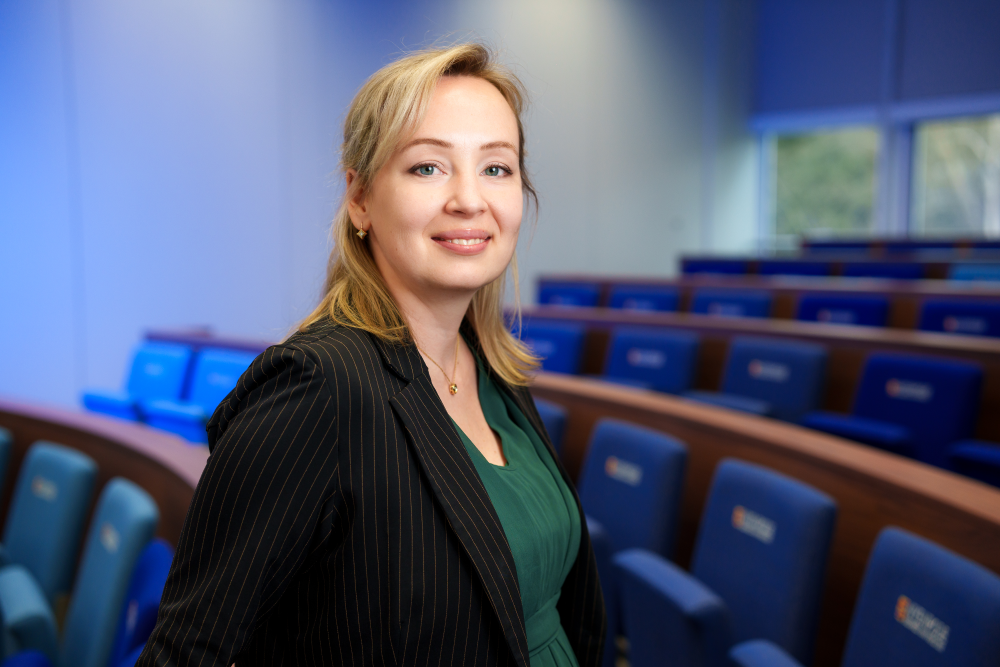ESG due diligence voor de financiële sector

Three questions for Yulia Levashova
1. What do you expect to be the impact of the research?
“Developing the guide on the quality and implementation of ESG due diligence framework for the financial sector would help financial institutions to improve investment decision-making process."
2. Why is this research important right now?
“As ESG due diligence rules are gaining momentum in the EU and other countries, this research has a tremendous practical and academic relevance. Without a clear and consistent due diligence framework for a financial sector the transition to a sustainable and a human rights based economy will be incomplete.”
3. What is the main purpose of the research? And what kind of output are you aiming at?
“Nyenrode’s mission is to contribute to a better world by educating and nurturing responsible leaders for a sustainable society. Shareholder activism and new legislative frameworks are driving a paradigm shift in the investment financial system, requiring responsible leaders to adopt sustainable financial strategies that prioritize transparency and positive impacts on ESG and human rights. The demand from civil society and leading institutional investors, such as ABN AMRO, to incorporate human rights due diligence obligations for the financial sector into the EU Corporate Sustainability Due Diligence Directive exemplifies the external and internal pressures on financial institutions to take an active role in preventing the negative impacts of corporate activities.
"Financial institutions’ lack of knowledge of diverse EU rules creates uncertainties regarding the scope of their due diligence duties"
The new standards for corporate reporting and ESG due diligence present substantial challenges for investors. Financial institutions’ lack of knowledge of diverse EU rules and their future implications creates uncertainties regarding the scope of their due diligence duties (e.g., the extent of their duty to provide victims with access to effective remedies; the scope of ESG reporting on climate change issues, etc.). This causes friction between various investors and other stakeholders, including international organizations and civil society. These subsequent frictions impede the essential transition to a sustainable financial system. The proposed research is particularly significant to society and the business sector in light of the EU’s continuing regulatory transitions. The study will provide concrete recommendations regarding the scope of ESG due diligence practices and contribute to the larger theoretical ESG debate, which aims to improve the investment decisions of various financial actors.
"The study will conclude by drafting a clear guide on the financial sector's due diligence framework."
An entrepreneurial ecosystem approach and a human rights-based economy theory will be used in this exploratory study to shed light on the role of ESG due diligence and how it affects long-term investment decisions. The study will examine how government interventions in ESG due diligence duties foster the formation of sustainable investment ecosystems. The study will conclude by drafting a clear guide on the financial sector's due diligence framework.
The PhD candidate performing the proposed study will use a qualitative methodology that includes a thorough literature review, an analysis of annual reports and other relevant documents, and in-depth interviews with various types of investors and experts."
About Yulia Levashova
Dr. Yulia Levashova is an associate professor at Nyenrode Business University. She is part of Nyenrode's Faculty Research Center for Entrepreneurship, Governance & Stewardship. She is also an Associate Research Fellow at Utrecht University.
Levashova has been working at Nyenrode since 2010. Her main research focus is on the legal aspects of foreign direct investment and corporate social responsibility (CSR) and due diligence. She has working on numerous multidisciplinary research projects, e.g. on illegal timber, case studies on South African government, and a business case for biodiversity (co-authoring the final reports).
Levashova has been working extensively on research concerning ESG due diligence and its impact on foreign and institutional investors. She has contributed to the report for the Dutch Ministry of Foreign Affairs, “Effectiveness and implementation of RBC frameworks for private sector instruments: an examination of beneficiaries’ international activities and business relationships” (2019), and presented a Dutch draft bill for international responsible business conduct with the focus on due diligence to the MPs of the Swiss Parliament (2022). Levashova has extensively published on the EU Corporate Sustainability Due Diligence Directive.
Support our research for a sustainable world
Would you like to join us in contributing to a sustainable world? Then please donate to Stichting Nyenrode Fonds (Nyenrode Fund Foundation), so that we can continue to finance studies like these. We are a private university, and do not receive funding from the government. We depend entirely on private donations from our community.
With your support, we can appoint a young academic professional to conduct this research. By supporting us, you can help Nyenrode while offering young talent the chance to take the next step in their academic career.
Contact
-
Christina Ceulemans
Job title Sr. relations manager fundraiserPhone number +31 (0) 682 607 913Email address Send me an email

